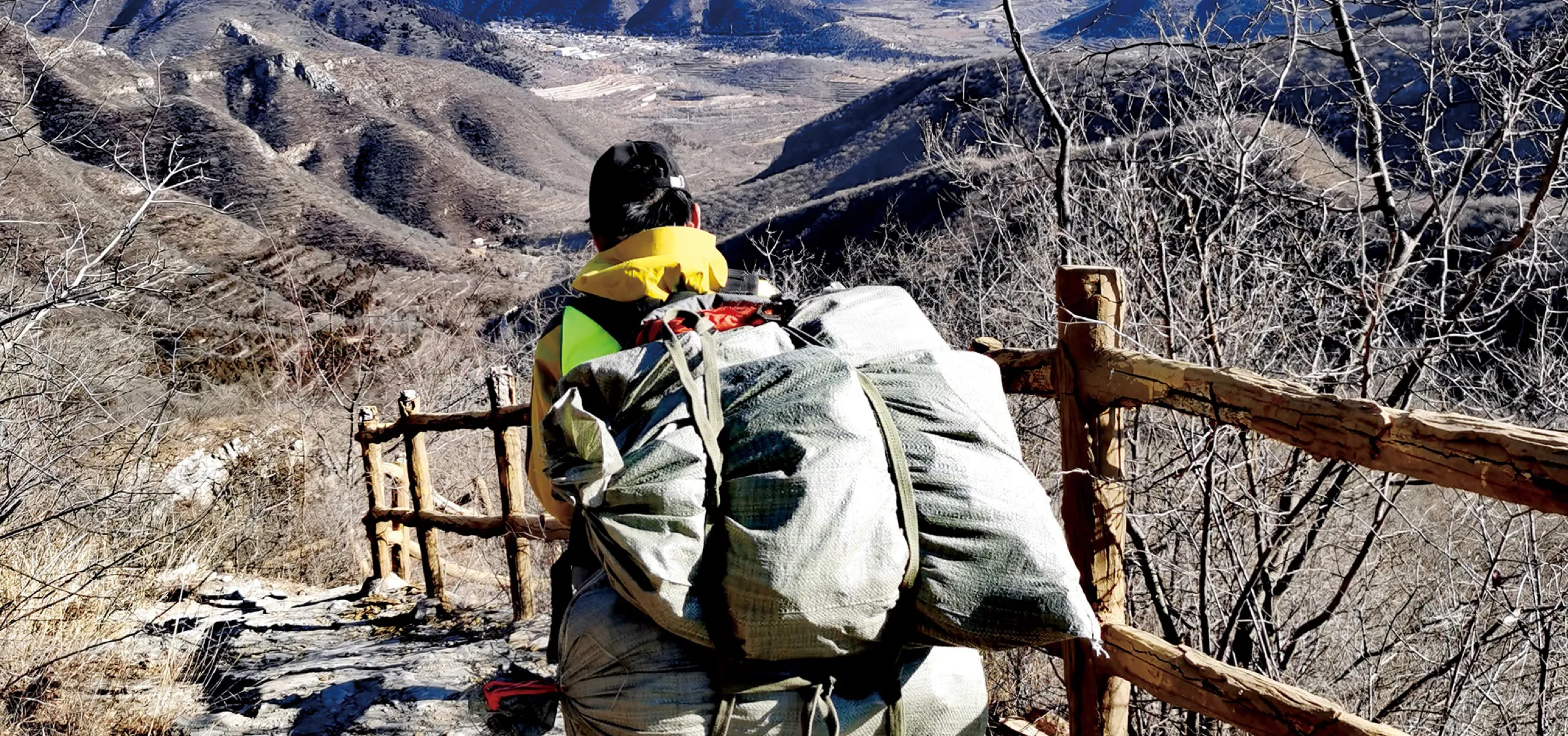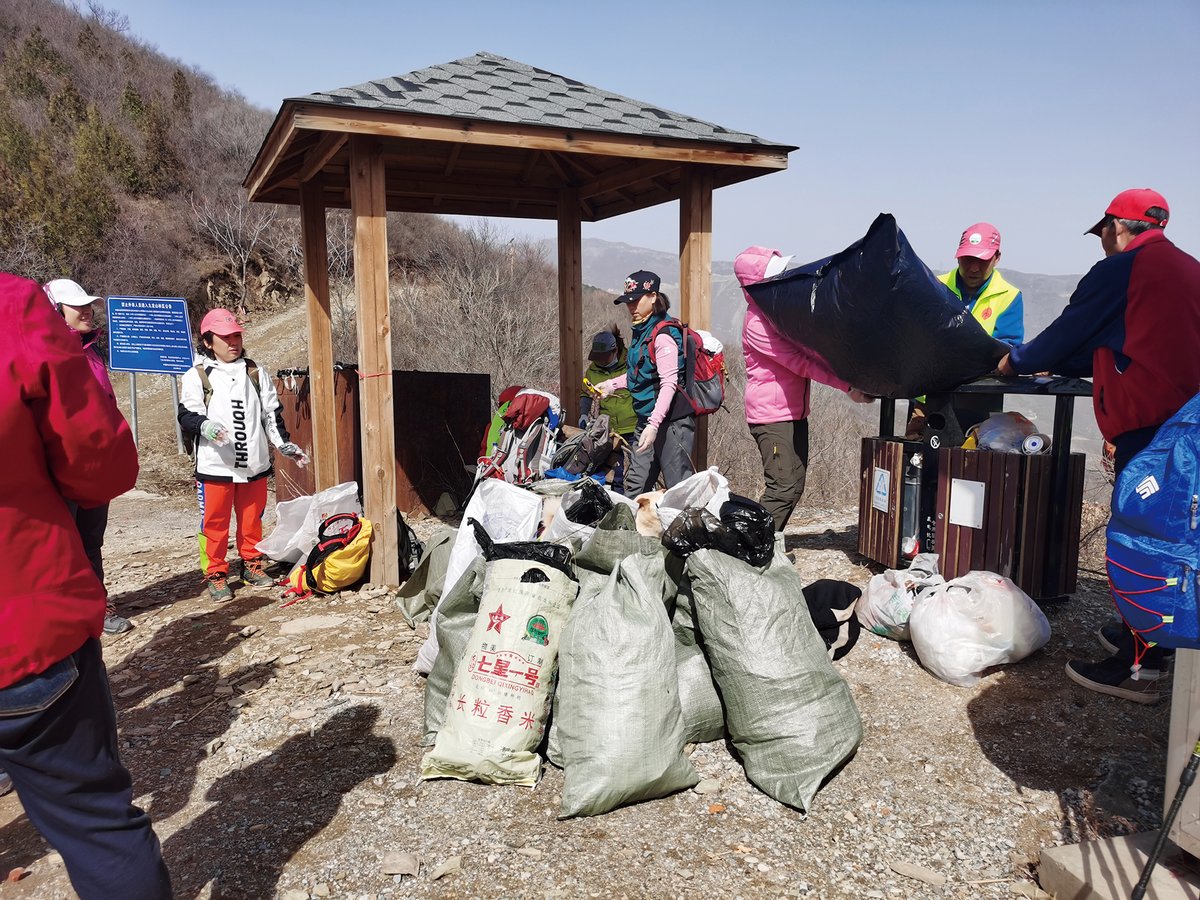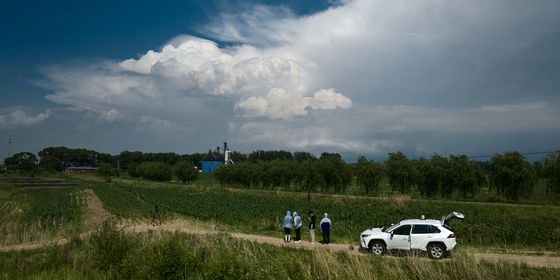As urban nature-lovers head outdoor, rural communities struggle with the ecological impact
Living in “Beijing’s Most Beautiful Village” is a blessing and curse for Wang Junqing. The 63-year-old party secretary starts off each day by worrying about the growing piles of plastic trash left everywhere in the mountainous Xiangtun village, in the capital’s Yanqing district. “Plastic bags, disposable cartons, and other white trash have been found more and more, thrown here and there in our village, and it’s mostly from travelers coming in.”
Ironically, this problem began after Xiangtun joined the government’s “Beautiful Village” rural tourism development project in 2007, attracting a growing number of outdoor-lovers to explore the area’s picturesque valleys, streams, and Great Wall ruins.
To Xiangtun’s 100 residents (mostly chestnut farmers), “trash” used to refer to organic scraps they could feed their pigs, chickens, and other livestock. But as the number of visitors climbed, Wang has had to dispatch locals to patrol the village and the nearby mountain three times a week to report litterers and collect waste. Sanitation staff hired by the district go up the mountain once a week collecting litter and emptying overflowing bins, transporting them to a landfill 30 kilometers away.
As China’s middle class embraces hiking and other outdoor pursuits, the booming ecotourism sector has put increased pressure on local ecological resources. A string of outdoor pollution cases have hit the Chinese headlines over the past five years. In 2016, a group of backpackers on Hebei province’s Little Wutai Mountain dug trenches to set up their tents in a fragile alpine meadow and stripped the area clean of wildflowers. In 2017, three hikers scaled Python Peak on Mount Sanqingshan in Jiangxi province by fixing 26 expansion bolts into the granite cliffs with electric drills, causing irreparable damage to this 200-million-year-old geological formation. In 2019, four off-road vehicles drove over parts of Inner Mongolia’s Xilingol Grassland, which will take hundreds of years to recover, and one driver taunted law enforcement officers who tried to stop them.
According to the Civil Code of the PRC which became effective this January, those who cause severe pollution and environmental damage will be sued for compensation by the victims. Criminal sentences may be dealt to those who discharge “hazardous substances,” or destroy historical relics.
This is rarely enough to deter wrongdoers. “Without laws, we can’t fine and punish violators, and these days we need to do everything by the book; so we can only try to persuade people and hope they regulate themselves,” says Wang.
Some outdoor enthusiasts have taken the matter into their own hands. Yu Youjun, an air-conditioner mechanic in Beijing’s suburban Mentougou district, started a mountain cleanup group in 2016 and leads volunteers on “mountain clearing” hikes every weekend. Just a week before he spoke to TWOC, he led more than 90 volunteers over 10 kilometers in Beijing’s Western Hills to pick up over 500 kilograms of trash.
However, such grassroots efforts fall far short of needs. In Wang’s village, “though volunteers come to help collect trash once a week, it is not nearly enough [to deal with all trash],” he says. His office also organizes local party members to help clean up the area.
In remote rural communities where much of this outdoor recreation takes place, a lack of facilities and funding is a running concern. “We need to hire at least four cleaners more than the five we currently have [to handle the volume of visitors]. One cleaner costs 150 yuan per day. We can’t afford that,” Wang estimates. The local town government has allocated 30 trash cans to the area, but Wang reckons the village needs twice that amount given the volume of tourists, and feels existing trash cans are not emptied regularly enough.
The environmental degradation is usually rooted in tourists’ lack of awareness of their environmental impact. Last March, Yu’s team discovered six off-road vehicles had driven over the “Horse Hoofprints,” a section of the “Jingxi Ancient Road” bearing footmarks of horses and donkeys from the days when caravans had transported coal through Beijing’s western suburbs in the Ming dynasty (1368 – 1644). After the media picked up the story, one of the car owners called Yu to explain they hadn’t known the site was a cultural relic.
This echoes the experience of Yang Guoqing, a museum curator in Beijing’s Changping district who leads backpackers in his leisure time. “Some people won’t even recognize an ancient ruin if there’s no stone plaque [stating] it is a protected cultural relic,” he says. Last December, he joined Yu’s team in setting up their own stone plaque at the Horse Hoofprints, but he worries that it “won’t be as effective as one with the name of the Cultural Relics Bureau carved on it.”
In order to protect natural relics, some scenic sites have chosen to close. In 2015, authorities closed the Niubei Mountain in Sichuan province for three years partly due to the damage inflicted by tourists—pits full of trash, and over 100 tents and wooden cabins illegally constructed on the slopes. In 2017, to protect natural resources in Qinghai Lake, the local government forbade travelers from going onto Birds Island and Sand Island, two scenic areas within a national nature reserve.
Outdoor enthusiasts disagree with this one-size-fits-all solution. “It is human nature to contact with nature. We were allowed to visit the Great Wall so that we know its history, but a ban will keep our next generation from learning from these historic sites,” says Yang. “Are we just going to rely on experts’ research?”
Some advocate stronger punishment for misbehaving tourists, or letting them pay for their own damage to the ecosystem. One of the drivers who made tire marks in the grassland in 2019 was fired by his employer and promised to plant over 10 mu of trees in the county every year.
Wang advocates a middle-of-the-road solution. “We don’t emphasize punishment, but if these situations continue to arise with these tourists, we will need to put a limit on the number of tourists and charge them a cleanup fee,” he says. This proposal is still waiting for approval from various government departments, which Wang believes will be a difficult process.
Yang still hopes the problem won’t result in limiting outdoor recreation. “It is when you go out into the wilderness that you develop a better understanding of nature. In recent years, with government improvements, the efforts of the media, and travelers’ own awareness, there is already a huge difference,” he says. “This is going to be a great test for the government and the grassroots.”
Leave no Trace: The Environmental Costs of Nature Tourism in China is a story from our issue, “Call of the Wild.” To read the entire issue, become a subscriber and receive the full magazine.













